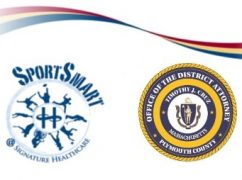 Keeping our Communities, Families and Children Safe
Keeping our Communities, Families and Children Safe
Together with you, Signature Health Care and
the Plymouth County District Attorney’s Office
If you are interested in scheduling a SportSmart presentation, please email our office at: PlymouthDA.CommunityPrograms@state.ma.us
Substance Abuse
Results from the 2013 National Survey on Drug Use and Health:
Summary of National Findings
• In 2013, 7.1% of youths aged 12 to 17 were current users of marijuana.
• 2.2% were current nonmedical users of psychotherapeutic drugs.
• 0.5 % were current users of inhalants.
• 0.6% were current users of hallucinogens.
• 0.2% were current users of cocaine.
According to the CDC, everyday 44 people in the U.S. die from an overdose of prescription painkillers and many more become addicted.
Know the Facts
Drugs are both natural and synthetic. New drugs are constantly being produced and can be found on the streets. Casual or experimental drug use can quickly turn into drug abuse, dependence, or addiction, and can lead to accidents, legal trouble, and serious health issues.
Take Control
Substance abuse is a danger and we should be mandated to fight back and save our children. Nothing is stronger than parental intuition. If you think something is wrong, you are probably right. You have to act quickly!
Prescription Drugs
Children and teenagers are getting addicted to medications prescribed by healthcare professionals. There is a perception that prescription drugs are safe because a medical professional prescribes them. These pills, whether prescribed by a medical professional or purchased on the street, are addictive and potentially lethal.
Healthcare professionals are under incredible pressure to accommodate patients. Surgeries are now typically outpatient. Even teenagers are sent home with prescriptions for 60 to 90 Oxycodone (Percocet). If an athlete has surgery from a sports injury, narcotics are prescribed. Due to the effect they have on the athlete, or possibly due to complications, an athlete may be prescribed even more.
The prescriptions may come to an end but “craving” the drug does not. This can lead to purchasing pills on the streets. This is expensive and soon he or she is seeking cheaper drugs, such as heroin.
Don’t Overlook Changes In Your Child
• Are the grades falling off?
• Has your child become more reclusive?
• Are you noticing a new group of friends?
• Is there a change in attitude and hygiene?
• Are they sleeping more?
• Are they staying out late or later than usual?
• Is money missing?
• Catching him or her in lies?
What Should You Do If You Suspect Drug Abuse?
1. Talk with your spouse/partner.
Commit to presenting a united front, even if you disagree on the issue, you need to give your child the message that you are a team.
2. Talk to their teachers and coaches to see if there have been some new concerns and changes in attitude.
3. Contact your child’s friend’s parents and let them know you are worried about your child.
You may find out they too are worried and/or have information.
4. Use social media.
There is nothing wrong with “creeping” on Facebook or Instagram.
5. Go through or have them show you their texts and emails especially from their “new friends.”
6. Check their room.
Look in dresser drawers, car glove box, back of closets, corners of bed sheets, under mattresses or bed, empty candy wrappers, over the counter medication bottles, or drop ceilings.
7. Be prepared for your teen’s reaction.
They will not be happy. They may say things like, “You are ruining my life”, “You don’t trust me”, “You don’t know what you are talking about”, “I hate you”, “Why can’t you be more like my friend’s parents?”
8. Use websites like drugs.com.
Every pill carries an identifying number or code on them. You can use the “pill identifier” on these websites to determine what the pill is. If there is no identifying code on the pill, you may have a problem.
9. Reach out for help.
If your child has an addiction, you cannot do this alone. The sooner you get help for your family and child, the better the chances for success.
10. Reach out to:
a School Counselor, Professional Therapist, or Addiction Counselor.
11. Contact your Pediatrician or Family Physician.
Types of Substances that can be abused
• Alcohol
• Bath Salts
• Benzodiazepines
• Cocaine
• Cough Syrup
• Hallucinogens (LSD)
• Ketamine (PCP)
• Marijuana
• MDMA (Molly, Ecstasy)
• Methamphetamine
• Narcotics
• Pseudoephedrine
• Spice or Synthetic Marijuana
All drugs, when taken, can make the person vulnerable to diseases such as hepatitis and HIV from sharing needles. Rape, sexual assaults, and sexually transmitted diseases can occur. Injury and even death from trauma and overdose are always a distinct possibility.
References:
• High Point Treatment Centersopens in a new window
• Drug Factsopens in a new window
• Massachusetts Department of Public Healthopens in a new window
• Massachusetts Substance Abuse Information & Educationopens in a new window
• National Institute of Drug Abuseopens in a new window
• Substance Abuse and Mental Health Services Administrationopens in a new window
